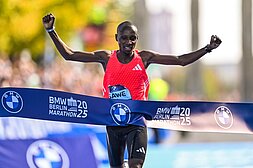Realistic Marathon Times: the 10K Test as a Benchmark two Months before Race Day
When preparing for a marathon, one big question eventually comes up: What goal time is realistic? Two months before the BMW BERLIN-MARATHON, a 10K race—like the adidas Runners City Night — can provide a valuable assessment of your current fitness level. Sports scientist Angela Hänsel (SCC EVENTS) explains how to use this to determine a realistic marathon goal time.

Many runners use the adidas Runners City Night to optimize their marathon training. @ SCC EVENTS
BMW BERLIN-MARATHON in sight: Two months before is the right time
If you’re running the BMW BERLIN-MARATHON on September 21, you should assess your current form by July at the latest. A 10K race is ideal for this. For those training in or near Berlin, the adidas Runners City Night is a great option. If you're not local, you can do the test on your own — on a measured course or using a GPS watch under race-like conditions.
“A 10K test two months before the marathon is a valuable indicator—not just for your marathon time, but also for training focus.”
Angela Hänsel, sports scientist (SCC EVENTS Medical Team) and former elite athlete)
Why 10 Kilometers?
A 10K race is intense enough to measure your fitness level, but short enough not to risk overtraining. Especially important: a 10K challenges your anaerobic system far more than a marathon does. In other words, during a 10K, you'll run at an intensity where your oxygen demand temporarily exceeds what your body can supply.
In contrast, the marathon primarily relies on aerobic energy — long-lasting, efficient and based on fat metabolism.
Despite the physiological differences, a 10K test still shows how efficient your cardiovascular system is overall — which forms the basis for all training paces in marathon prep. At this point, two months out, you’ll usually have a solid base and enough time to fine-tune your speed, endurance and race tactics.
So, the test not only helps predict your marathon time, but also reveals where to focus your training.
From 10K to 42.195K – Predicting a realistic marathon pace
There are several tools and formulas to estimate your marathon pace — like the Riegel formula or pace charts. These give you a general idea but must always be interpreted in context: your endurance, training history and structure all matter.
10K Time | Estimated Marathon Time | Notes |
|---|---|---|
50 minutes | ~3:55–4:05 hours | Only achievable with regular long runs and structured tempo work |
60 minutes | ~4:50–5:00 hours | Solid endurance base needed, tempo training helps maintain pace |
70 minutes | ~5:45–6:00 hours | Goal: Finish healthy – plan for nutrition and walking breaks |
Caution: Endurance still plays a major role
These estimates assume ideal conditions. In reality, marathon performance also depends heavily on:
- Aerobic capacity (fat metabolism, running efficiency)
- Smart pacing
- Mental resilience
Common pitfalls:
- Fast over short distances, but lack long runs → play it safe with goals
- Strong endurance, low top speed → prediction often quite accurate
- First-time marathon runner → add a 5–10 minute buffer
How to get the most Out of your 10K Test
- Choose the right race: Officially measured, flat and wind-protected course.
- Give full effort: Only with maximum intensity will the test deliver meaningful data.
- Plan timing wisely: At least 48 hours after hard workouts, allow 3–5 days of recovery afterward.
Using your projected time as a training compass
A well-chosen marathon goal time doesn’t just help on race day — it also structures your training. That doesn’t mean running at marathon pace all the time. Instead, build key sessions around it:
- Intervals: e.g., 5 × 1,000 m at your 10K race pace
- Threshold runs: e.g., 6–8k at half-marathon pace
- Marathon pace practice: e.g., include 1,000 m at marathon pace at the end of a long run
Conclusion: Think smart, run with heart
Numbers are helpful guides — but they don’t tell the whole story. A 10K test helps you plan a realistic marathon time. But in the end, it’s you, not your calculator, running the marathon.
Related News
Our sponsors













BMW

BMW GERMANY - A STRONG PARTNER FOR RUNNING.
BMW has been the title sponsor of Germany's biggest marathon since 2011. At this running event, the world's elite come together to top the current best times.
Strength. Endurance. Efficiency. These are not only the most important attributes of a runner, but also apply to BMW's sustainable vehicles. BMW has been setting standards in sustainability for years and successfully demonstrates them at the BMW BERLIN MARATHON. But also before the event BMW accompanies the running community in their preparation and emphasizes the joy of running. With the perennial RUN FOR JOY campaign, BMW, supports the athletes in their preparation - together they make the impossible possible. The lead vehicle, the new BMW i5 supports the runners on the course. It has exactly the qualities needed for a successful marathon run: intelligent and responsible use of resources. And it is precisely with these skills that the all-electric vehicle guides the runners safely, purposefully and in an environmentally friendly manner through the capital.
More than 50 vehicles and around 15 scooters of the C evolution class are part of the fleet of support vehicles provided by BMW for the BMW BERLIN-MARATHON. In addition to the iX as a safety car, the latest i-models from the car manufacturer are also in use as shuttle and organization vehicles. With this commitment, BMW supports the sustainable development of modern technology and the sport of running.
adidas

Everything at adidas reflects the spirit of our founder, Adi Dassler. Improving the athlete’s performance was his goal; today, his legacy continues with the consumer at the heart of everything the adidas brand does.
The number of runners in Germany is constantly increasing. No matter where they come from, they all have the same goal: Improve. Better runners, better athletes and in the end a better version of themselves.
adidas Running has something for everyone – we want help each person achieve their individual goals. What counts is personal development, which goes far beyond the personal best.
Abbott

At Abbott, our 114,000 employees in more than 160 countries are devoted to advancing life-changing technologies that help people achieve their full potential. Our medical devices, diagnostic tools and nutrition products are designed to enable individuals to reach their personal best, however they define it. By sponsoring the Abbott World Marathon Majors, a series of the six largest and most renowned marathons in the world, including the BMW BERLIN-MARATHON, we are not just celebrating the pinnacle of physical endurance and determination – we are reinforcing our commitment to improving lives. The Abbott World Marathon Majors are a testament to health and the human spirit at their finest, showcasing that with the right support and determination, every finish line is within reach.
More on Facebook at www.facebook.com/Abbott and on Twitter @AbbottNews and @AbbottGlobal.
Zalando

Are you ready to take your running to the next level? As the official sponsor of the BMW BERLIN-MARATHON, Zalando is here to help you reach your goals. Running a marathon is challenging enough - you need the right equipment to feel completely comfortable. Our functional sportswear can do much more than just look good: From marathon training to relaxed runs - find your perfect outfit at Zalando and run with us!
GENERALI

Generali Germany has been our partner since 2018. The insurance group is part of the international Generali Group and thus also part of a company that is over 190 years old, its history and its heritage. In 2017, the company launched a new sponsorship strategy - “Generali moves Germany”.
The initiative aims to motivate people to lead active health and environmentally conscious lives. Taking part, not watching, is crucial here. In recent years, Generali has thus become one of the largest and most important sponsors in German running. Running promotes physical and mental health and thus has a preventive effect against numerous common diseases. Moreover, hardly any other sport can be practiced in such a resource-saving and environmentally friendly way. Together with the event organizers, Generali develops programs that make major events demonstrably sustainable: in the areas of environmental and climate protection and social commitment.
About 9 million customers are insured with the companies of Generali Germany, which include the brands Generali, CosmosDirekt and Dialog in the life, health and property/casualty segments. Generali's objective is to be a lifetime partner for its customers, offering innovative, individual solutions and services thanks to an excellent sales network in exclusive and direct sales as well as in the broker channel. Generali Germany is part of the "Germany, Austria and Switzerland" (DACH) business unit, which was newly created in 2022.
ERDINGER Alkoholfrei

ERDINGER Alkoholfrei refreshes all finishers behind the finish line. ERDINGER Alkoholfrei is the ideal beverage after sports: isotonic, rich in vitamins, and low in calories. And ERDINGER Alkoholfrei has only 125 kcl per 0.5-liter bottle! Because a varied and balanced diet and a healthy lifestyle are important!
Revolut

Revolut is a digital bank with the mission to radically simplify finances for individuals and businesses. Founded in 2015 in the UK with the goal of making international money transfers faster and cheaper than traditional banks, Revolut today covers all key areas of finance—from everyday banking and saving to investing and international payments. Over 60 million people worldwide, including more than 2 million in Germany, trust Revolut.
https://www.revolut.com/
Shokz

Shokz is the world’s leading consumer electronics brand focused on acoustic innovation and renowned for its groundbreaking developments in wireless open-ear headphones.
Shokz is committed to exploring new possibilities for the open-ear listening experience, embracing the principle of staying connected to your surroundings and nature, and empowering you to enjoy your music while remaining open to the world.
NORQAIN

NORQAIN – Official Timing Partner of the BMW BERLIN-MARATHON
NORQAIN is once again the Official Timing Partner of the BMW BERLIN-MARATHON!
Precision, endurance, and determination are not only essential to the race – they’re also part of our DNA. Together with the pacemakers, we celebrate the global running community and support thousands of runners on their journey to a new personal best, in line with our motto: My life, my way. At the heart of our presence is the Wild ONE collection – our high-performance sports watch designed for those who dare to push their limits.
We look forward to celebrating the marathon spirit with you!
Blackroll

"BLACKROLL® is dedicated to helping people of all ages, sports levels and lifestyles take their health, well-being and performance into their own hands every day. For an optimal balance between tension & relaxation and a pain-free life full of energy, mobility and sustainable performance.
It all started in 2007 with the first fascia roller. Today, the Healthstyle Company offers a whole range of innovative products and solutions that convince experts in sports and health."
Biotherm

With Skin Fitness, Biotherm offers a complete range of premium skincare designed for active women and men seeking effective solutions for a fitter skin: a skin that looks younger, stronger, healthier, in shape for longer. Combining cutting-edge biotechnology, with Biotech Plankton™, and the power of fitness supplements, Biotherm powers up skin cell metabolism. Biotherm: You Work Out, We Work In.
Maurten

You probably know that you burn carbohydrates when you run – both in training and during the race. And how hard it can be getting the fueling right, without GI-distress.
Our Hydrogel Technology makes sure you get enough carbohydrates without risking the session or race. But there are no shortcuts – science has shown that training your guts makes a huge difference.
VILSA

Naturality meets sustainability
As a mineral water, VILSA accompanies you with refreshing purity and light mineralisation. But that's not all! We are committed to people, animals and the environment: as a family-owned, midsized company in its fourth generation, we see it as an obligation and the core of our company philosophy to stand up for nature and the conservation of our resources in order to preserve them for future generations.
Discover our variety of products and enjoy the natural freshness of VILSA.























![[Translate to Englisch:] [Translate to Englisch:]](/fileadmin/_processed_/a/0/csm_Masse-Start-bunt-laufen_e5ba163bb7.jpg)

![[Translate to Englisch:] Plogging-Aktion von Organisator SCC EVENTS nach dem BMW BERLIN-MARATHON © SCC EVENTS](/fileadmin/_processed_/1/9/csm_Aufmacher_e3273a05ea.jpeg)

